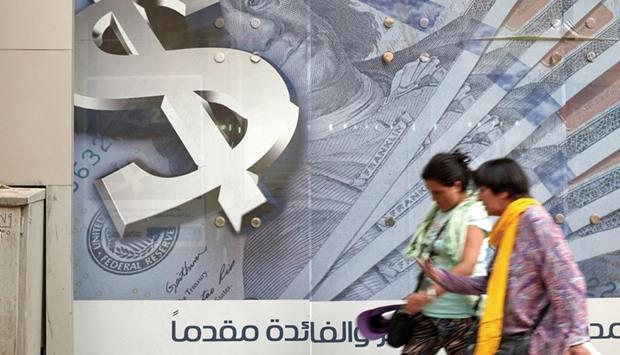
403
Sorry!!
Error! We're sorry, but the page you were looking for doesn't exist.
Egypt's core inflation rate eases in December
(MENAFN- Gulf Times) Egypt's urban consumer price inflation was steady at 11.1% in December, unchanged from the previous month, while its core inflation eased to 7.23%, the central bank and the state's official statistics agency CAPMAS said yesterday.
Core inflation, which excludes items such as fruit and vegetables whose prices fluctuate widely, eased to 7.23% in December from 7.44% in November.
The country of around 90mn relies heavily on imports of food and energy and has been struggling to earn hard currency since a popular uprising in 2011 drove tourists and foreign investors away.
Egypt has been facing mounting pressure to devalue the currency since it has been rationing dollars to keep the pound artificially strong at 7.7301 pounds. In December it raised its key interest rates by 0.5 percentage points, citing inflationary pressures as the reason behind the decision.
Since November the government had made it a priority to rein in rising food prices and has listed commodities that would be subject to price controls. It also expanded the mandate of its state grain buyer to import cheaper foods, and deployed army trucks to distribute subsidised meals.
"Food inflation has declined slightly on a month-on-month basis, indicating that the government initiative to distribute food at low prices is starting to reap benefits," said Hany Farahat, senior economist at CI Capital.
"The inflation outlook in 2016 will depend mainly on devaluation, which in our view will materialise in the first quarter of 2016. This will add to inflationary pressures going forward."
Separately, Egypt's central bank kept the pound steady against the dollar at its official foreign currency auction yesterday, and the currency held steady on the black market as well.
The central bank surprised markets when it strengthened the pound on November 11 by 20 piasters against the dollar and has bucked expectations by holding it steady ever since.
The central bank sold $39.4 at a cut-off price of 7.7301 pounds to the dollar, unchanged from the previous auction last Tuesday.
The official rate is still far stronger than the black market rate, which was around 8.58 pounds to the dollar, unchanged from Tuesday.
The country has been starved of foreign currency since a popular uprising in 2011 ousted autocrat Hosni Mubarak and drove tourists and foreign investors away.
Egypt's reserves have tumbled from $36bn in 2011 to $16.4bn, and the country has been rationing dollars through weekly dollar auctions to banks, keeping the pound artificially strong.
The bank's Monetary Policy Committee (MPC) raised benchmark rates by 50 basis points last month, citing inflationary pressures.
In February, the central bank imposed capital controls, limiting dollar-denominated deposits to $50,000 a month in an attempt to fight the black market. The move caused problems for importers who could no longer source foreign currency to clear goods, which piled up at ports.
Core inflation, which excludes items such as fruit and vegetables whose prices fluctuate widely, eased to 7.23% in December from 7.44% in November.
The country of around 90mn relies heavily on imports of food and energy and has been struggling to earn hard currency since a popular uprising in 2011 drove tourists and foreign investors away.
Egypt has been facing mounting pressure to devalue the currency since it has been rationing dollars to keep the pound artificially strong at 7.7301 pounds. In December it raised its key interest rates by 0.5 percentage points, citing inflationary pressures as the reason behind the decision.
Since November the government had made it a priority to rein in rising food prices and has listed commodities that would be subject to price controls. It also expanded the mandate of its state grain buyer to import cheaper foods, and deployed army trucks to distribute subsidised meals.
"Food inflation has declined slightly on a month-on-month basis, indicating that the government initiative to distribute food at low prices is starting to reap benefits," said Hany Farahat, senior economist at CI Capital.
"The inflation outlook in 2016 will depend mainly on devaluation, which in our view will materialise in the first quarter of 2016. This will add to inflationary pressures going forward."
Separately, Egypt's central bank kept the pound steady against the dollar at its official foreign currency auction yesterday, and the currency held steady on the black market as well.
The central bank surprised markets when it strengthened the pound on November 11 by 20 piasters against the dollar and has bucked expectations by holding it steady ever since.
The central bank sold $39.4 at a cut-off price of 7.7301 pounds to the dollar, unchanged from the previous auction last Tuesday.
The official rate is still far stronger than the black market rate, which was around 8.58 pounds to the dollar, unchanged from Tuesday.
The country has been starved of foreign currency since a popular uprising in 2011 ousted autocrat Hosni Mubarak and drove tourists and foreign investors away.
Egypt's reserves have tumbled from $36bn in 2011 to $16.4bn, and the country has been rationing dollars through weekly dollar auctions to banks, keeping the pound artificially strong.
The bank's Monetary Policy Committee (MPC) raised benchmark rates by 50 basis points last month, citing inflationary pressures.
In February, the central bank imposed capital controls, limiting dollar-denominated deposits to $50,000 a month in an attempt to fight the black market. The move caused problems for importers who could no longer source foreign currency to clear goods, which piled up at ports.

Legal Disclaimer:
MENAFN provides the
information “as is” without warranty of any kind. We do not accept
any responsibility or liability for the accuracy, content, images,
videos, licenses, completeness, legality, or reliability of the information
contained in this article. If you have any complaints or copyright
issues related to this article, kindly contact the provider above.


















Comments
No comment